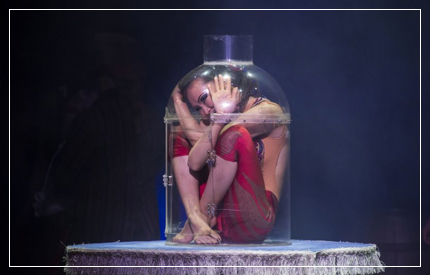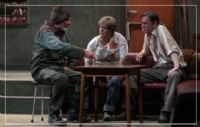Review: Cirque Berserk
Date: 15/03/2017
Theatre Review

If you have a thing for Big Top thrills but don't fancy carting yourself through a muddy field on a soggy afternoon, then Cirque Berserk!, billed as "real circus made for theatre", is a promising compromise.
Camped at Belfast's Grand Opera House, the show aims to provide something of the three-ring experience but with indoor comfort. Founded and directed by Martin Burton, aka Zippo the Clown from the famous Zippo's Circus, Berserk is a broad, electric approach to modern circus performing, executed by a skilled roster.
The Berserk title over-sells the show's mad energy a little, but there is an emphasis on high-tempo performances and visually interesting displays.
The Timbuktu Tumblers, African performers dressed in pirate-puffy garb, get things off to an energetic start with hoop jumping routines and pyramid acrobatics, a slightly repetitive act spiced up by a flaming limbo crab walk.
Next, the Tropicana Troupe emerge to pumping techno beats, with shredded shirtless abs and tight leather trousers. The entourage of Cuban hunks perform flick flacks and somersaults using an on-stage see-saw, and as impressive as it is, one can't shake the impression their job is to also provide an extra jolt of libidinous entertainment for the mums in the audience.
Other acts are lodged more firmly in traditional aesthetics, like seaside pier high-kicking girls, knife throwing and blade magic routines, or Zula, a Mongolian master balancer who perches himself atop a tower of jumbled chairs.
Acrobats dangle in the air and perform tricks and spins, while youthful Colombian duo Jose and Gaby act out a romantic, dexterous modern dance routine that's compelling in its simplicity.
Tweedy the Clown, a recurring stage presence, has stumbled straight out of a silent comedy slapstick act from a town hall in 1950s Bordeaux. He drops his belongings, exaggerates panto confusion and can never seem to keep his bowler hat on, his antics accompanied by the tragicomic wheeze of a Gallic accordion. At one point he invites a pair of middle-aged men up to the stage. One gets into the dramatic spirit of thing; the other, when asked to sit down at the end, actually plonks himself down on the stage, a nice moment of unplanned silliness.
Often it's the less showy acts that are the most impressive, requiring coiled self-control and refined athleticism. The flexible Odka stands on her hands and bends back a bow and arrow with her legs to hit a target on stage. France's Germaine Delbosq is an incredible foot juggler, spinning and catching rings, cubes and fiery wheels while lying on her back, displaying remarkable precision and rhythm.
The variety show structure helps keep the pace light – acts generally don't stick around long enough to get boring - but the "and now this" approach does make them feel disconnected from each other.
Other parts of the show really feel like spare parts, like a Transformers ripoff, credited as simply "Giant Robot", that walks around on stage and blasts spurts of flame. It feels like a cheap attention grab for the kiddies.
When the mecha is pursued off stage by other performers in the second half, it feels like it might be building to something, but nothing comes of it. The acts are pretty disparate and some kind of loose, overarching narrative would help build momentum and provide a more satisfying conclusion. There are actually two, very different, closers.
The Lucuis Team, a quartet of motorcyclists, spin around a steel cage named the Globe of Death. It's dangerous and loud and very showy, and it's clear the crowd appreciates it, but the X-Game petrolics feel a little over-eager after Tweedy's simple vaudeville au revoir. In a crowded show, small moments of artistry shine clearest.
Conor Smyth
cirqueberserk.co.uk
Camped at Belfast's Grand Opera House, the show aims to provide something of the three-ring experience but with indoor comfort. Founded and directed by Martin Burton, aka Zippo the Clown from the famous Zippo's Circus, Berserk is a broad, electric approach to modern circus performing, executed by a skilled roster.
The Berserk title over-sells the show's mad energy a little, but there is an emphasis on high-tempo performances and visually interesting displays.
The Timbuktu Tumblers, African performers dressed in pirate-puffy garb, get things off to an energetic start with hoop jumping routines and pyramid acrobatics, a slightly repetitive act spiced up by a flaming limbo crab walk.
Next, the Tropicana Troupe emerge to pumping techno beats, with shredded shirtless abs and tight leather trousers. The entourage of Cuban hunks perform flick flacks and somersaults using an on-stage see-saw, and as impressive as it is, one can't shake the impression their job is to also provide an extra jolt of libidinous entertainment for the mums in the audience.
Other acts are lodged more firmly in traditional aesthetics, like seaside pier high-kicking girls, knife throwing and blade magic routines, or Zula, a Mongolian master balancer who perches himself atop a tower of jumbled chairs.
Acrobats dangle in the air and perform tricks and spins, while youthful Colombian duo Jose and Gaby act out a romantic, dexterous modern dance routine that's compelling in its simplicity.
Tweedy the Clown, a recurring stage presence, has stumbled straight out of a silent comedy slapstick act from a town hall in 1950s Bordeaux. He drops his belongings, exaggerates panto confusion and can never seem to keep his bowler hat on, his antics accompanied by the tragicomic wheeze of a Gallic accordion. At one point he invites a pair of middle-aged men up to the stage. One gets into the dramatic spirit of thing; the other, when asked to sit down at the end, actually plonks himself down on the stage, a nice moment of unplanned silliness.
Often it's the less showy acts that are the most impressive, requiring coiled self-control and refined athleticism. The flexible Odka stands on her hands and bends back a bow and arrow with her legs to hit a target on stage. France's Germaine Delbosq is an incredible foot juggler, spinning and catching rings, cubes and fiery wheels while lying on her back, displaying remarkable precision and rhythm.
The variety show structure helps keep the pace light – acts generally don't stick around long enough to get boring - but the "and now this" approach does make them feel disconnected from each other.
Other parts of the show really feel like spare parts, like a Transformers ripoff, credited as simply "Giant Robot", that walks around on stage and blasts spurts of flame. It feels like a cheap attention grab for the kiddies.
When the mecha is pursued off stage by other performers in the second half, it feels like it might be building to something, but nothing comes of it. The acts are pretty disparate and some kind of loose, overarching narrative would help build momentum and provide a more satisfying conclusion. There are actually two, very different, closers.
The Lucuis Team, a quartet of motorcyclists, spin around a steel cage named the Globe of Death. It's dangerous and loud and very showy, and it's clear the crowd appreciates it, but the X-Game petrolics feel a little over-eager after Tweedy's simple vaudeville au revoir. In a crowded show, small moments of artistry shine clearest.
Conor Smyth
cirqueberserk.co.uk




































